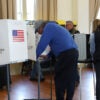As Congress’ September deadline to approve or condemn the Iran deal approaches, the Obama administration has intensified its lobbying efforts, appealing to individual members of Congress who remain on the fence.
Last Friday, President Obama drafted a letter to Rep. Jerrold Nadler D-N.Y., defending what he calls “a very good deal for the United States” that will eliminate all pathways to a nuclear weapon, facilitate the full or partial “snapback” of sanctions, and ensure “tremendous oversight.”
Nadler announced his support of the deal later that day, albeit with little enthusiasm. He assessed the deal as “far from perfect, to put it mildly.” Nadler is not the only politician to have voiced support of the deal begrudgingly.
The administration has accused Republicans of lining up to oppose the deal before it was even released. However, blaming concerns on party bias dismisses legitimate criticisms that span both sides of the aisle.
Consider the following references to the Iran deal and its provisions:
- Rep. Adam Schiff, D-Calif. – “a bitter pill to swallow”
- Sen. Claire McCaskill, D-Mo. – “I respect and understand those who oppose it”
- Sen. Bernie Sanders, I-Vt. – “This agreement is obviously not all that many of us would have liked but it beats the alternative”
- Sen. Tom Udall, D-N.M. – “We have a choice between this deal or no deal. I do not believe we will get another chance”
- Sen. Bob Menendez, D-N.J. – “if Iran is to acquire a nuclear bomb, it will not have my name on it”
- Sen. Charles Schumer, D-N.Y. – “If Iran’s true intent is to get a nuclear weapon, under this agreement, it must simply exercise patience”
At best, these officials have characterized the deal as the lesser of two evils. At worst, it could be considered a time bomb.
According to the deal, “Iran has stated that if sanctions are reinstated in whole or in part, Iran will treat that as grounds to cease performing its commitments under this [deal] in whole or in part,” at which point sanctions relief will have left Iran $100-$140 billion richer—by the Obama administration’s own admission.
As foreign investment pours into the Iranian economy, the international community will sacrifice the leverage it acquired over a decade of sanctions and consequently strengthen the world’s largest state sponsor of terrorism.
Even if Iran breaks the deal, it is in a better position to advance its nuclear agenda than it was prior to negotiations. Otherwise, it need only exercise patience. What is 15 years in the lifetime of a nation?
Thankfully, there are not only two options, as supporters of the deal suggest.
The U.S. can still block the agreement, impose unilateral economic sanctions, restore U.S. credibility in the Middle East, and keep all future options on the table. Sanctions brought Iran to the table, and sanctions can bring them back.
There is still time to demand a better deal.
































